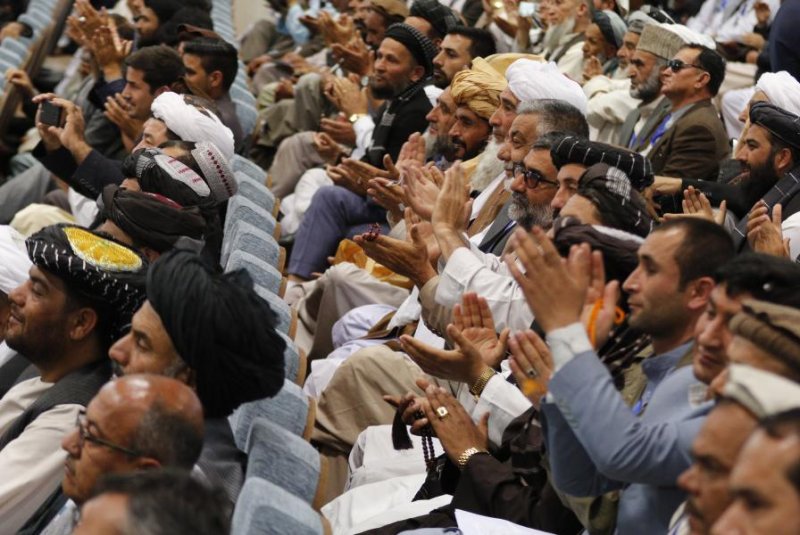Afghen leaders applaud during a speech by Afghan President Ashraf Ghani during the closing ceremony of the Loya Jerga, or national assembly. Leaders overwhelmingly called for a cease fire after nearly two decades of war. Photo by Jawad Jalajli
May 3 (UPI) -- Leading Afghan politicians and religious leaders are calling for an immediate cease-fire to end nearly 20 years of war in Afghanistan.
More than 3,200 representatives, including tribal and ethnic leaders, split into dozens of individual committees in the Afghan capital under tight security to discuss a pathway to peace.
The Loya Jirga, Afghan's grand assembly, set a date for May 6, the beginning of the Muslim holy month of Ramadan. Some politicians, including chief executive Abdullah Abdullah, boycotted the assembly, saying they had not been consulted by President Ashraf Ghani. Ghani has alienated much of the political elite in the country by leaving them out of the peace efforts. The Taliban, who have been in peace talks with U.S. officials, rejected the truce.
In a statement, the Taliban said waging jihad, or a holy war, during Ramadan would bring "even more [holy] rewards." The group called the Loya Jirga "symbolic" and a "failure." They see the Afghan government as a puppet of the West.
"@US4AfghanPeace should forget about the idea of us putting down our arms," Taliban spokesman Zabihullah Mujahid tweeted. "Instead of such fantasies, he should drive the idea home (U.S.) about ending the use of force & incurring further human & financial losses for the decaying Kabul administration."
The Taliban wants to postpone peace talks until U.S. troops leave the country. But China, Russia and other countries have put pressure on the Taliban to support U.S. demands for peace now.
Hundreds of women attended the assembly and set out their "red lines" for negotiations with the Taliban.
Semin Noori, head of one of the assembly committees, said the "withdrawal of foreign forces should not mean that all advances made in women's rights are forgotten and we are forced to suffer again."
Abdul Hanna, a committee chairman, urged "both sides to announce a cease-fire."
"The war will end only when both sides stop fighting before they sign a permanent peace agreement," Hannan said.
"Every day, Afghans are being killed without any reason. An unconditional cease-fire must be announced," said Mohammad Qureshi, another committee leader.
U.S. special representative for Afghanistan reconciliation Zalmay Khalilzad started a sixth round of direct negotiations with the Taliban in Doha, Qatar, on Wednesday.
"It is time to put down arms, stop the violence, & embrace peace," Khalilzad said.















